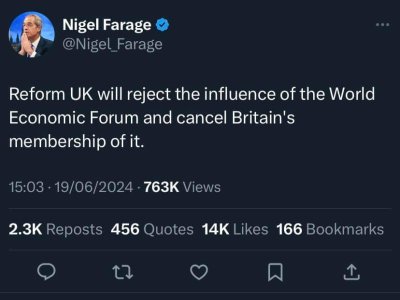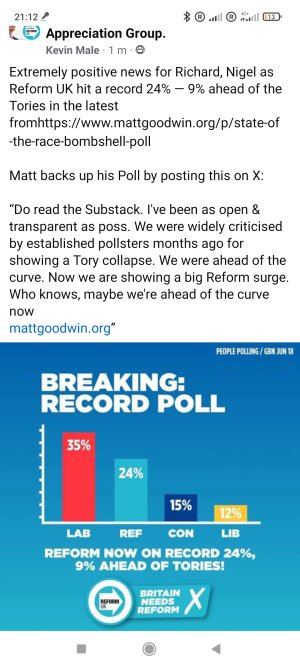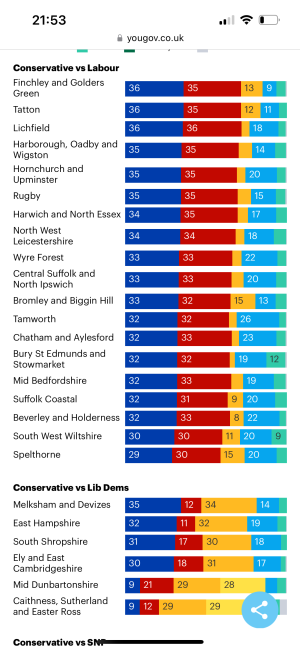You are using an out of date browser. It may not display this or other websites correctly.
You should upgrade or use an alternative browser.
You should upgrade or use an alternative browser.
2024 General Election Thread
- Thread starter Sniffer
- Start date
Deutsch Wolf
Sponsored by Amazon Prime. DM me for discounts...
- Joined
- Oct 16, 2009
- Messages
- 113,159
- Reaction score
- 43,666
Imagine.
I still think they'll nudge 150 seats when push comes to shove. We've seen first hand recently that what people say doesn't necessarily hold up when it's actually decision time
Hereford Wolf
Well-known member
- Joined
- Feb 15, 2011
- Messages
- 3,126
- Reaction score
- 869
I nearly chocked on my coffee watching Politics Today at lunchtime.
Yorkshire farmers complaining that since Brexit, they have a reduced standing in Europe and with the European farmers and it’s not fair.
Must of been my imagination, all those UKIP and Brexit signs in the farmers fields at the time.
Yorkshire farmers complaining that since Brexit, they have a reduced standing in Europe and with the European farmers and it’s not fair.
Must of been my imagination, all those UKIP and Brexit signs in the farmers fields at the time.
Tony Towner
Well-known member
- Joined
- Feb 18, 2010
- Messages
- 41,493
- Reaction score
- 29,361
As much as The Tories being destroyed would be beyond entertaining a weak opposition whoever it is isn't good for democracy
AndyWolves
Well-known member
- Joined
- Oct 28, 2010
- Messages
- 18,348
- Reaction score
- 8,854
Neither are The ToriesAs much as The Tories being destroyed would be beyond entertaining a weak opposition whoever it is isn't good for democracy
Stan Hullis
Talked the talk and walked the walk.
- Joined
- Nov 24, 2010
- Messages
- 16,891
- Reaction score
- 2,610
Deutsch Wolf
Sponsored by Amazon Prime. DM me for discounts...
- Joined
- Oct 16, 2009
- Messages
- 113,159
- Reaction score
- 43,666
From Anthony Seldon (who I think it is fair to say knows his stuff), damning:
In comparison to the earlier four periods of one-party dominance post-1945, it is hard to see the years since 2010 as anything but disappointing. By 2024, Britain’s standing in the world was lower, the union was less strong, the country less equal, the population less well protected, growth more sluggish with the outlook poor, public services underperforming and largely unreformed, while respect for the institutions of the British state, including the civil service, judiciary and the police, was lower, as it was for external bodies, including the universities and the BBC, repeatedly attacked not least by government, ministers and right-wing commentators.
Do the unusually high number of external shocks to some extent let the governments off the hook? One above all – Brexit – was entirely of its own making and will be seen in history as the defining decision of these years. In 2024, the verdict on Brexit is almost entirely negative, with those who are suffering the most from it, as sceptics at the time predicted, the most vulnerable. The nation was certainly difficult to rule in these fourteen years, the Conservative party still more so. Longstanding problems certainly contributed to the difficulties the prime minister faced in providing clear strategic policy, including the 24-hour news cycle, the rise of social media and AI, and the frequency of scandals and crises. But it was the decision of the prime minister to choose to be distracted by the short term, rather than focusing on the strategic and the long term. The prime minister has agency: the incumbents often overlooked it.
Overall, it is hard to find a comparable period in history of a Conservative, or other, government which achieved so little, or which left the country at its conclusion in a more troubling state.
Very few cabinet ministers from 2010 to 2024 could hold a candle to the team who served under Clement Attlee – which included Ernest Bevin, Nye Bevan, Stafford Cripps, Hugh Gaitskell and Herbert Morrison. Or the teams who served under Wilson, Thatcher or Blair. Michael Gove, Jeremy Hunt and Philip Hammond were rare examples of ministers of quality after 2010 …
A strong and capable prime minister is essential to governmental success in the British system. The earlier four periods saw two historic and landmark prime ministers, ie Churchill and Thatcher, with a succession of others who were capable if not agenda-changing PMs, including Macmillan, Wilson, Major and Blair. Since 2010, only Cameron came close to that level, with Sunak the best of the rest. Policy virtually stopped under May as Brexit consumed almost all the machine’s time, while serious policymaking ground to a halt under Johnson’s inept leadership, the worst in modern premiership, and the hapless Truss. Continuity of policy was not helped by each incoming prime minister despising their predecessor, with Truss’s admiration for Johnson the only exception. Thus they took next no time to understand what it was their predecessors were trying to do, and how to build on it rather than destroy it.
In comparison to the earlier four periods of one-party dominance post-1945, it is hard to see the years since 2010 as anything but disappointing. By 2024, Britain’s standing in the world was lower, the union was less strong, the country less equal, the population less well protected, growth more sluggish with the outlook poor, public services underperforming and largely unreformed, while respect for the institutions of the British state, including the civil service, judiciary and the police, was lower, as it was for external bodies, including the universities and the BBC, repeatedly attacked not least by government, ministers and right-wing commentators.
Do the unusually high number of external shocks to some extent let the governments off the hook? One above all – Brexit – was entirely of its own making and will be seen in history as the defining decision of these years. In 2024, the verdict on Brexit is almost entirely negative, with those who are suffering the most from it, as sceptics at the time predicted, the most vulnerable. The nation was certainly difficult to rule in these fourteen years, the Conservative party still more so. Longstanding problems certainly contributed to the difficulties the prime minister faced in providing clear strategic policy, including the 24-hour news cycle, the rise of social media and AI, and the frequency of scandals and crises. But it was the decision of the prime minister to choose to be distracted by the short term, rather than focusing on the strategic and the long term. The prime minister has agency: the incumbents often overlooked it.
Overall, it is hard to find a comparable period in history of a Conservative, or other, government which achieved so little, or which left the country at its conclusion in a more troubling state.
Very few cabinet ministers from 2010 to 2024 could hold a candle to the team who served under Clement Attlee – which included Ernest Bevin, Nye Bevan, Stafford Cripps, Hugh Gaitskell and Herbert Morrison. Or the teams who served under Wilson, Thatcher or Blair. Michael Gove, Jeremy Hunt and Philip Hammond were rare examples of ministers of quality after 2010 …
A strong and capable prime minister is essential to governmental success in the British system. The earlier four periods saw two historic and landmark prime ministers, ie Churchill and Thatcher, with a succession of others who were capable if not agenda-changing PMs, including Macmillan, Wilson, Major and Blair. Since 2010, only Cameron came close to that level, with Sunak the best of the rest. Policy virtually stopped under May as Brexit consumed almost all the machine’s time, while serious policymaking ground to a halt under Johnson’s inept leadership, the worst in modern premiership, and the hapless Truss. Continuity of policy was not helped by each incoming prime minister despising their predecessor, with Truss’s admiration for Johnson the only exception. Thus they took next no time to understand what it was their predecessors were trying to do, and how to build on it rather than destroy it.
Tony Towner
Well-known member
- Joined
- Feb 18, 2010
- Messages
- 41,493
- Reaction score
- 29,361
For anyone who says they are all the same or is scornful towards the New Labour government domestically

 austeritycity.liverpoolecho.co.uk
austeritycity.liverpoolecho.co.uk

Liverpool: Austerity City
How 14 years of Conservative-led cuts have damaged a city and its people
- Joined
- Oct 5, 2010
- Messages
- 22,801
- Reaction score
- 6,961
Why wasn’t the Tory MP arrested? Effectively did the same thing.
Was the officer breaking the official secrets act whilst on duty whereas MPs aren’t subject to the same laws?
Tony Towner
Well-known member
- Joined
- Feb 18, 2010
- Messages
- 41,493
- Reaction score
- 29,361
Used privileged information he overheard as opposed to being told?Why wasn’t the Tory MP arrested? Effectively did the same thing.
Stan Hullis
Talked the talk and walked the walk.
- Joined
- Nov 24, 2010
- Messages
- 16,891
- Reaction score
- 2,610
Misconduct in a public office for a serving PC I thinkWhy wasn’t the Tory MP arrested? Effectively did the same thing.
Was the officer breaking the official secrets act whilst on duty whereas MPs aren’t subject to the same laws?
Del Woppio
Virgin geek fuckwad
- Joined
- Oct 16, 2009
- Messages
- 27,492
- Reaction score
- 15,440
If you heard a thunder clap a few minutes ago, it was the collective orgasms of my friends at the Nigel Farage / reform appreciation group, as sole nut job has released a poll that looks like this
Del Woppio
Virgin geek fuckwad
- Joined
- Oct 16, 2009
- Messages
- 27,492
- Reaction score
- 15,440
Tony Towner
Well-known member
- Joined
- Feb 18, 2010
- Messages
- 41,493
- Reaction score
- 29,361
Lichfield won't flip, it did in a by election with Sylvia Heal after John Heddle died in 1990, but they've moved the boundaries since then. If it does then then 50 odd seat projection will be accurate because looking at that polling it would lose because of Reform
Last edited:
- Joined
- Aug 10, 2011
- Messages
- 63,669
- Reaction score
- -40,266
Similar threads
- Replies
- 240
- Views
- 14K
- Replies
- 61
- Views
- 12K
- Replies
- 71
- Views
- 10K




